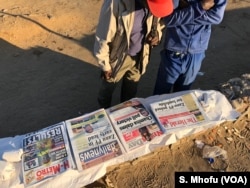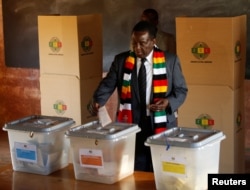Two people were shot dead in Zimbabwe's capital Wednesday as security forces clashed with protesters who were demanding the release of presidential election results.
Following the clash, police invoked a law formally calling on the army to help maintain order in Harare.
Meanwhile, Zimbabweans were anxiously waiting for tallies from Monday's presidential election, the first in 38 years without longtime leader Robert Mugabe on the ballot. The opposition maintained that its leader, Nelson Chamisa, defeated current President Emmerson Mnangagwa.
About 150 demonstrators gathered Wednesday afternoon outside the offices of the Zimbabwe Electoral Commission (ZEC). Police tried to disperse the protesters using water cannons and tear gas. Protesters threw rocks in their direction and started fires in the street.
Then the army appeared, in armored personnel carriers on Harare's main boulevard and overhead in a helicopter. VOA saw five armored vehicles with mounted high-caliber weapons, navigating around large rocks that littered the road. Gunfire echoed in the distance.
VOA saw three soldiers beating a young man with batons; other witnesses reported seeing one man shot dead and a woman face down on the pavement, a bullet hole in the middle of her back.
Protesters did not give their names but had plenty to say.
“You see, they are using military! How can a general be a president? That government is full of military personnel!” shouted one young man.
Chamisa's spokesman, Nkululeko Sibanda, rejected an accusation from Mnangagwa that the opposition was responsible for the violence.
Chamisa "has not ordered any guns on the street. So he cannot be accused of being violent, because he has put no guns on the street," Sibanda said.
He said the opposition had serious doubts about official results that showed the ruling ZANU-PF party was winning control of parliament, and about the delay in the release of presidential results.
"How do we have results from a place that has no telephone line first before we have results from Harare central?" he asked. Harare is an opposition stronghold.
Inside the headquarters of ZEC, international observers aired their concerns, with the European Union and American observer missions voicing worry over “subtle intimidation” ahead of the vote and noting that the longer the results took, the more tense this wounded nation would be.
Former Ethiopian Prime Minister Hailemariam Desalegn urged the ZEC to conclude the electoral process “in a speedy manner in accordance with the law."
“We also urge other stakeholders, particularly political party leaders and their supporters, to continue to maintain peace and refrain from acts that might undermine the integrity of the process or threaten the peace and stability of the country,” Desalegn said.
Mnangagwa urged calm on Twitter.
Mnangagwa, who took over in November after Mugabe resigned as president under pressure from the military, has promised to restore the nation’s fractured international relations.
U.S. Democratic Representative Karen Bass of California, who was in Harare, said this election could make a difference in Zimbabwe.
“Shortly before coming here, we passed out of the House of Representatives a resolution really calling on the Zimbabwean people to have a peaceful, transparent and fair election, and raising the possibility of evaluating U.S. policy. So that hangs in the air,” she said.
But as the sun set on Harare with soldiers patrolling the streets, the only thing in the air was tension, and the fear of more violence in the days to come.







